Organisational Behaviour Report: Sainsbury's Analysis
VerifiedAdded on 2023/01/16
|14
|4546
|72
Report
AI Summary
This report provides an analysis of organizational behaviour within Sainsbury's, a major UK supermarket chain, addressing its high floor staff turnover. It examines the influence of organizational culture, politics, and power on individual and team behaviour and performance, utilizing Handy's model to categorize organizational culture and French and Raven's power model to assess different types of power. The report also explores content and process theories of motivation, particularly Maslow's hierarchy of needs, and evaluates motivational techniques. It then compares effective and ineffective teams, analyzing team and group development theories. The report concludes by evaluating the influence of organizational behaviour concepts and philosophies on employee behaviour, offering insights into how Sainsbury's can improve its organizational structure and employee motivation to reduce staff turnover.
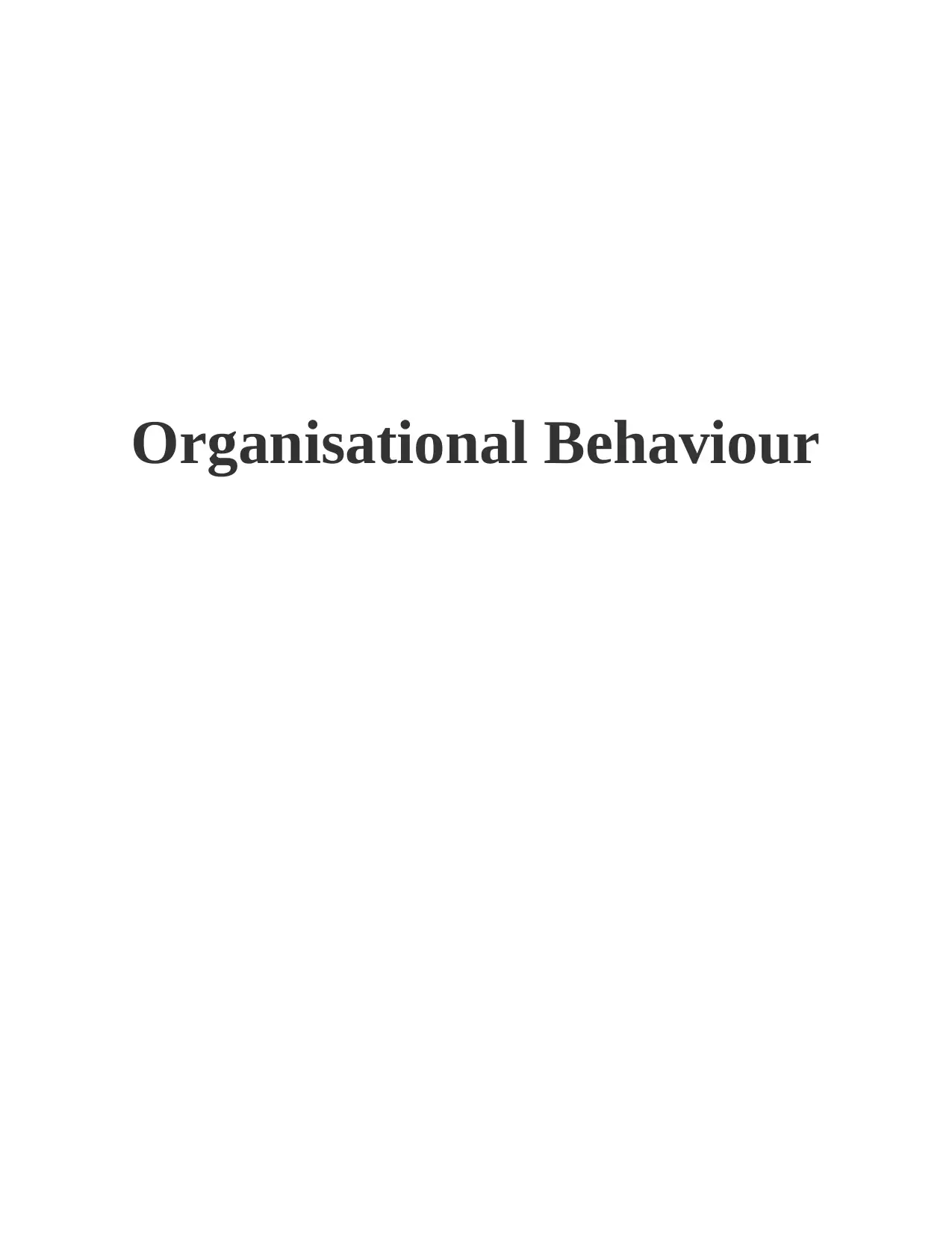
Organisational Behaviour
Paraphrase This Document
Need a fresh take? Get an instant paraphrase of this document with our AI Paraphraser
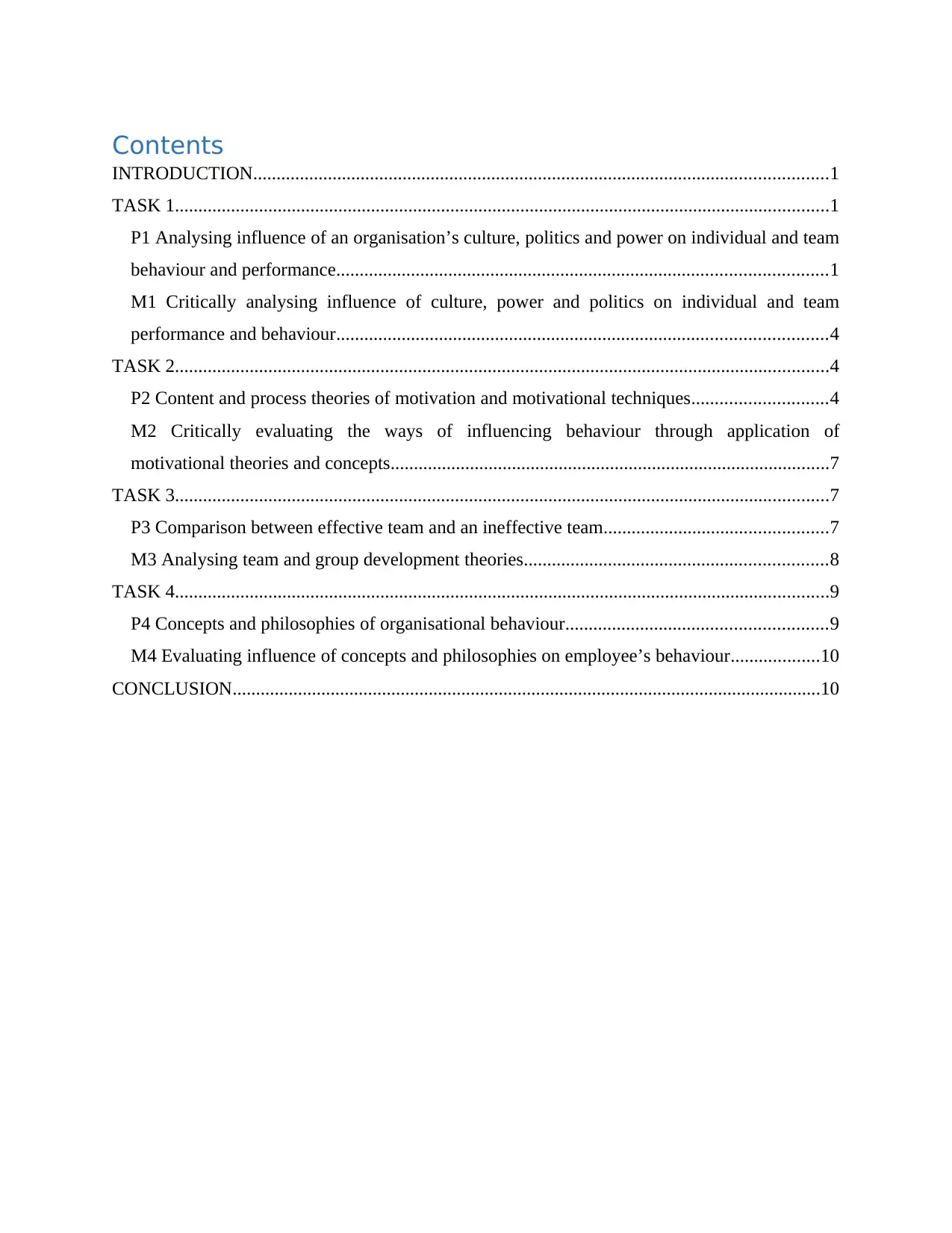
Contents
INTRODUCTION...........................................................................................................................1
TASK 1............................................................................................................................................1
P1 Analysing influence of an organisation’s culture, politics and power on individual and team
behaviour and performance.........................................................................................................1
M1 Critically analysing influence of culture, power and politics on individual and team
performance and behaviour.........................................................................................................4
TASK 2............................................................................................................................................4
P2 Content and process theories of motivation and motivational techniques.............................4
M2 Critically evaluating the ways of influencing behaviour through application of
motivational theories and concepts..............................................................................................7
TASK 3............................................................................................................................................7
P3 Comparison between effective team and an ineffective team................................................7
M3 Analysing team and group development theories.................................................................8
TASK 4............................................................................................................................................9
P4 Concepts and philosophies of organisational behaviour........................................................9
M4 Evaluating influence of concepts and philosophies on employee’s behaviour...................10
CONCLUSION..............................................................................................................................10
INTRODUCTION...........................................................................................................................1
TASK 1............................................................................................................................................1
P1 Analysing influence of an organisation’s culture, politics and power on individual and team
behaviour and performance.........................................................................................................1
M1 Critically analysing influence of culture, power and politics on individual and team
performance and behaviour.........................................................................................................4
TASK 2............................................................................................................................................4
P2 Content and process theories of motivation and motivational techniques.............................4
M2 Critically evaluating the ways of influencing behaviour through application of
motivational theories and concepts..............................................................................................7
TASK 3............................................................................................................................................7
P3 Comparison between effective team and an ineffective team................................................7
M3 Analysing team and group development theories.................................................................8
TASK 4............................................................................................................................................9
P4 Concepts and philosophies of organisational behaviour........................................................9
M4 Evaluating influence of concepts and philosophies on employee’s behaviour...................10
CONCLUSION..............................................................................................................................10

⊘ This is a preview!⊘
Do you want full access?
Subscribe today to unlock all pages.

Trusted by 1+ million students worldwide
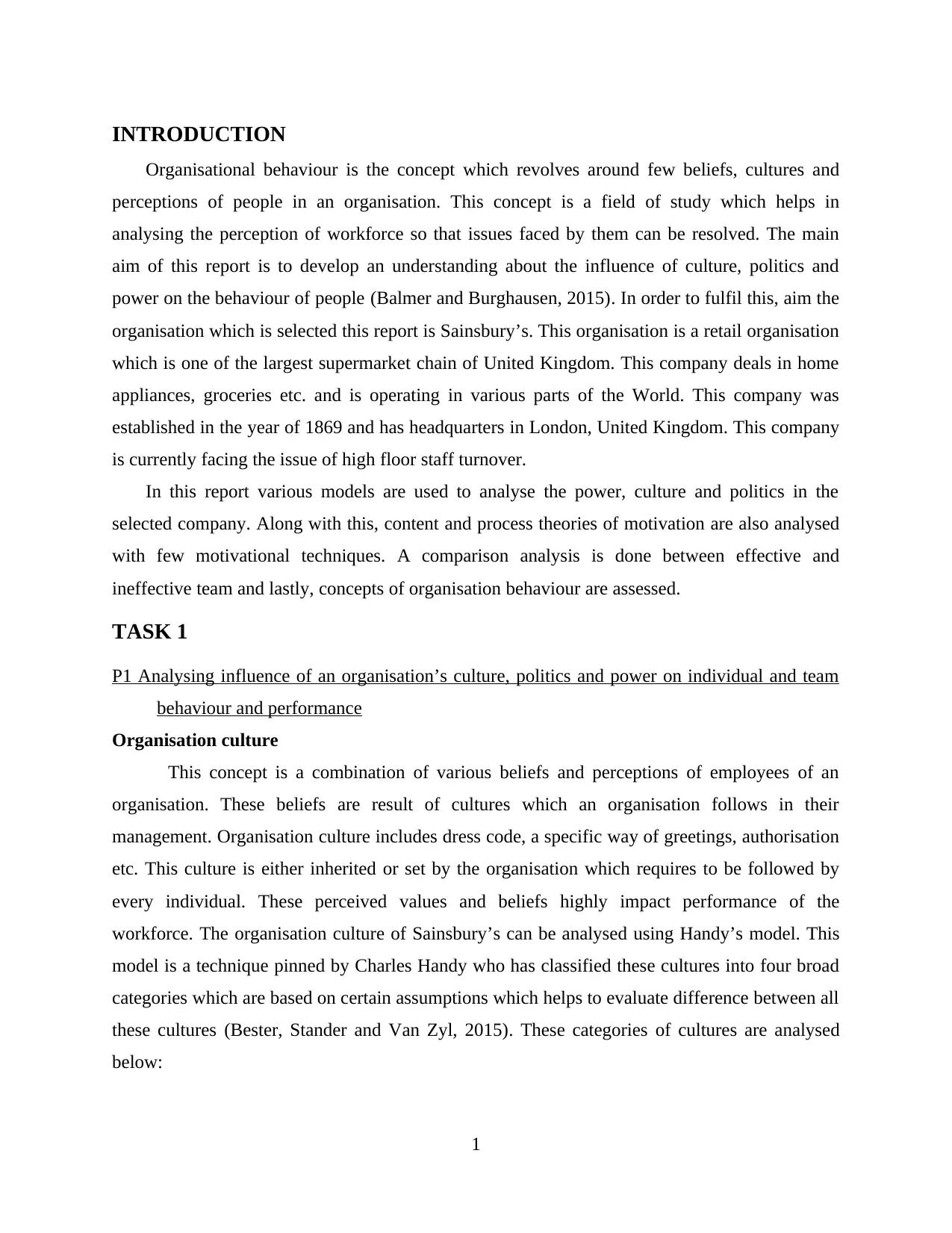
INTRODUCTION
Organisational behaviour is the concept which revolves around few beliefs, cultures and
perceptions of people in an organisation. This concept is a field of study which helps in
analysing the perception of workforce so that issues faced by them can be resolved. The main
aim of this report is to develop an understanding about the influence of culture, politics and
power on the behaviour of people (Balmer and Burghausen, 2015). In order to fulfil this, aim the
organisation which is selected this report is Sainsbury’s. This organisation is a retail organisation
which is one of the largest supermarket chain of United Kingdom. This company deals in home
appliances, groceries etc. and is operating in various parts of the World. This company was
established in the year of 1869 and has headquarters in London, United Kingdom. This company
is currently facing the issue of high floor staff turnover.
In this report various models are used to analyse the power, culture and politics in the
selected company. Along with this, content and process theories of motivation are also analysed
with few motivational techniques. A comparison analysis is done between effective and
ineffective team and lastly, concepts of organisation behaviour are assessed.
TASK 1
P1 Analysing influence of an organisation’s culture, politics and power on individual and team
behaviour and performance
Organisation culture
This concept is a combination of various beliefs and perceptions of employees of an
organisation. These beliefs are result of cultures which an organisation follows in their
management. Organisation culture includes dress code, a specific way of greetings, authorisation
etc. This culture is either inherited or set by the organisation which requires to be followed by
every individual. These perceived values and beliefs highly impact performance of the
workforce. The organisation culture of Sainsbury’s can be analysed using Handy’s model. This
model is a technique pinned by Charles Handy who has classified these cultures into four broad
categories which are based on certain assumptions which helps to evaluate difference between all
these cultures (Bester, Stander and Van Zyl, 2015). These categories of cultures are analysed
below:
1
Organisational behaviour is the concept which revolves around few beliefs, cultures and
perceptions of people in an organisation. This concept is a field of study which helps in
analysing the perception of workforce so that issues faced by them can be resolved. The main
aim of this report is to develop an understanding about the influence of culture, politics and
power on the behaviour of people (Balmer and Burghausen, 2015). In order to fulfil this, aim the
organisation which is selected this report is Sainsbury’s. This organisation is a retail organisation
which is one of the largest supermarket chain of United Kingdom. This company deals in home
appliances, groceries etc. and is operating in various parts of the World. This company was
established in the year of 1869 and has headquarters in London, United Kingdom. This company
is currently facing the issue of high floor staff turnover.
In this report various models are used to analyse the power, culture and politics in the
selected company. Along with this, content and process theories of motivation are also analysed
with few motivational techniques. A comparison analysis is done between effective and
ineffective team and lastly, concepts of organisation behaviour are assessed.
TASK 1
P1 Analysing influence of an organisation’s culture, politics and power on individual and team
behaviour and performance
Organisation culture
This concept is a combination of various beliefs and perceptions of employees of an
organisation. These beliefs are result of cultures which an organisation follows in their
management. Organisation culture includes dress code, a specific way of greetings, authorisation
etc. This culture is either inherited or set by the organisation which requires to be followed by
every individual. These perceived values and beliefs highly impact performance of the
workforce. The organisation culture of Sainsbury’s can be analysed using Handy’s model. This
model is a technique pinned by Charles Handy who has classified these cultures into four broad
categories which are based on certain assumptions which helps to evaluate difference between all
these cultures (Bester, Stander and Van Zyl, 2015). These categories of cultures are analysed
below:
1
Paraphrase This Document
Need a fresh take? Get an instant paraphrase of this document with our AI Paraphraser
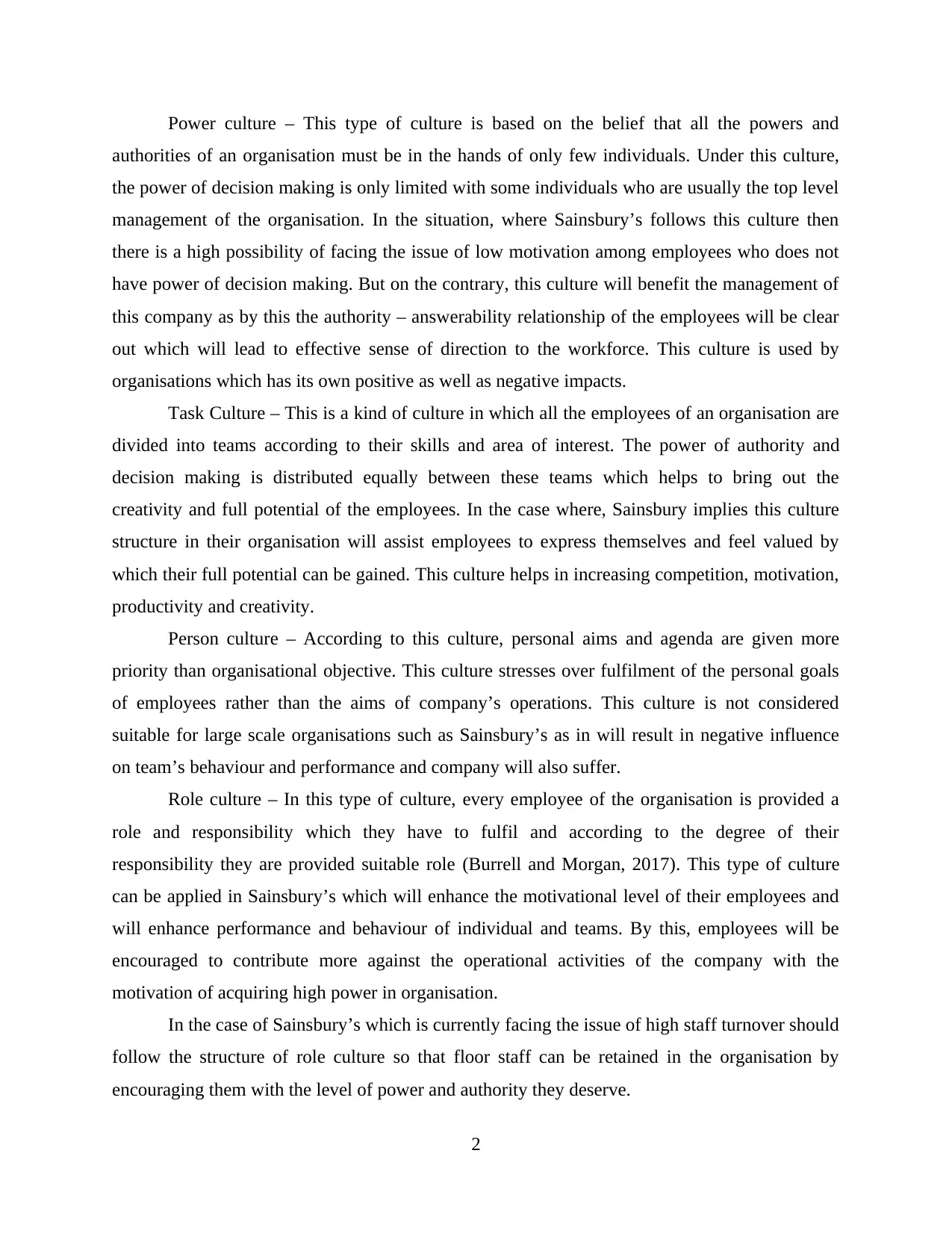
Power culture – This type of culture is based on the belief that all the powers and
authorities of an organisation must be in the hands of only few individuals. Under this culture,
the power of decision making is only limited with some individuals who are usually the top level
management of the organisation. In the situation, where Sainsbury’s follows this culture then
there is a high possibility of facing the issue of low motivation among employees who does not
have power of decision making. But on the contrary, this culture will benefit the management of
this company as by this the authority – answerability relationship of the employees will be clear
out which will lead to effective sense of direction to the workforce. This culture is used by
organisations which has its own positive as well as negative impacts.
Task Culture – This is a kind of culture in which all the employees of an organisation are
divided into teams according to their skills and area of interest. The power of authority and
decision making is distributed equally between these teams which helps to bring out the
creativity and full potential of the employees. In the case where, Sainsbury implies this culture
structure in their organisation will assist employees to express themselves and feel valued by
which their full potential can be gained. This culture helps in increasing competition, motivation,
productivity and creativity.
Person culture – According to this culture, personal aims and agenda are given more
priority than organisational objective. This culture stresses over fulfilment of the personal goals
of employees rather than the aims of company’s operations. This culture is not considered
suitable for large scale organisations such as Sainsbury’s as in will result in negative influence
on team’s behaviour and performance and company will also suffer.
Role culture – In this type of culture, every employee of the organisation is provided a
role and responsibility which they have to fulfil and according to the degree of their
responsibility they are provided suitable role (Burrell and Morgan, 2017). This type of culture
can be applied in Sainsbury’s which will enhance the motivational level of their employees and
will enhance performance and behaviour of individual and teams. By this, employees will be
encouraged to contribute more against the operational activities of the company with the
motivation of acquiring high power in organisation.
In the case of Sainsbury’s which is currently facing the issue of high staff turnover should
follow the structure of role culture so that floor staff can be retained in the organisation by
encouraging them with the level of power and authority they deserve.
2
authorities of an organisation must be in the hands of only few individuals. Under this culture,
the power of decision making is only limited with some individuals who are usually the top level
management of the organisation. In the situation, where Sainsbury’s follows this culture then
there is a high possibility of facing the issue of low motivation among employees who does not
have power of decision making. But on the contrary, this culture will benefit the management of
this company as by this the authority – answerability relationship of the employees will be clear
out which will lead to effective sense of direction to the workforce. This culture is used by
organisations which has its own positive as well as negative impacts.
Task Culture – This is a kind of culture in which all the employees of an organisation are
divided into teams according to their skills and area of interest. The power of authority and
decision making is distributed equally between these teams which helps to bring out the
creativity and full potential of the employees. In the case where, Sainsbury implies this culture
structure in their organisation will assist employees to express themselves and feel valued by
which their full potential can be gained. This culture helps in increasing competition, motivation,
productivity and creativity.
Person culture – According to this culture, personal aims and agenda are given more
priority than organisational objective. This culture stresses over fulfilment of the personal goals
of employees rather than the aims of company’s operations. This culture is not considered
suitable for large scale organisations such as Sainsbury’s as in will result in negative influence
on team’s behaviour and performance and company will also suffer.
Role culture – In this type of culture, every employee of the organisation is provided a
role and responsibility which they have to fulfil and according to the degree of their
responsibility they are provided suitable role (Burrell and Morgan, 2017). This type of culture
can be applied in Sainsbury’s which will enhance the motivational level of their employees and
will enhance performance and behaviour of individual and teams. By this, employees will be
encouraged to contribute more against the operational activities of the company with the
motivation of acquiring high power in organisation.
In the case of Sainsbury’s which is currently facing the issue of high staff turnover should
follow the structure of role culture so that floor staff can be retained in the organisation by
encouraging them with the level of power and authority they deserve.
2
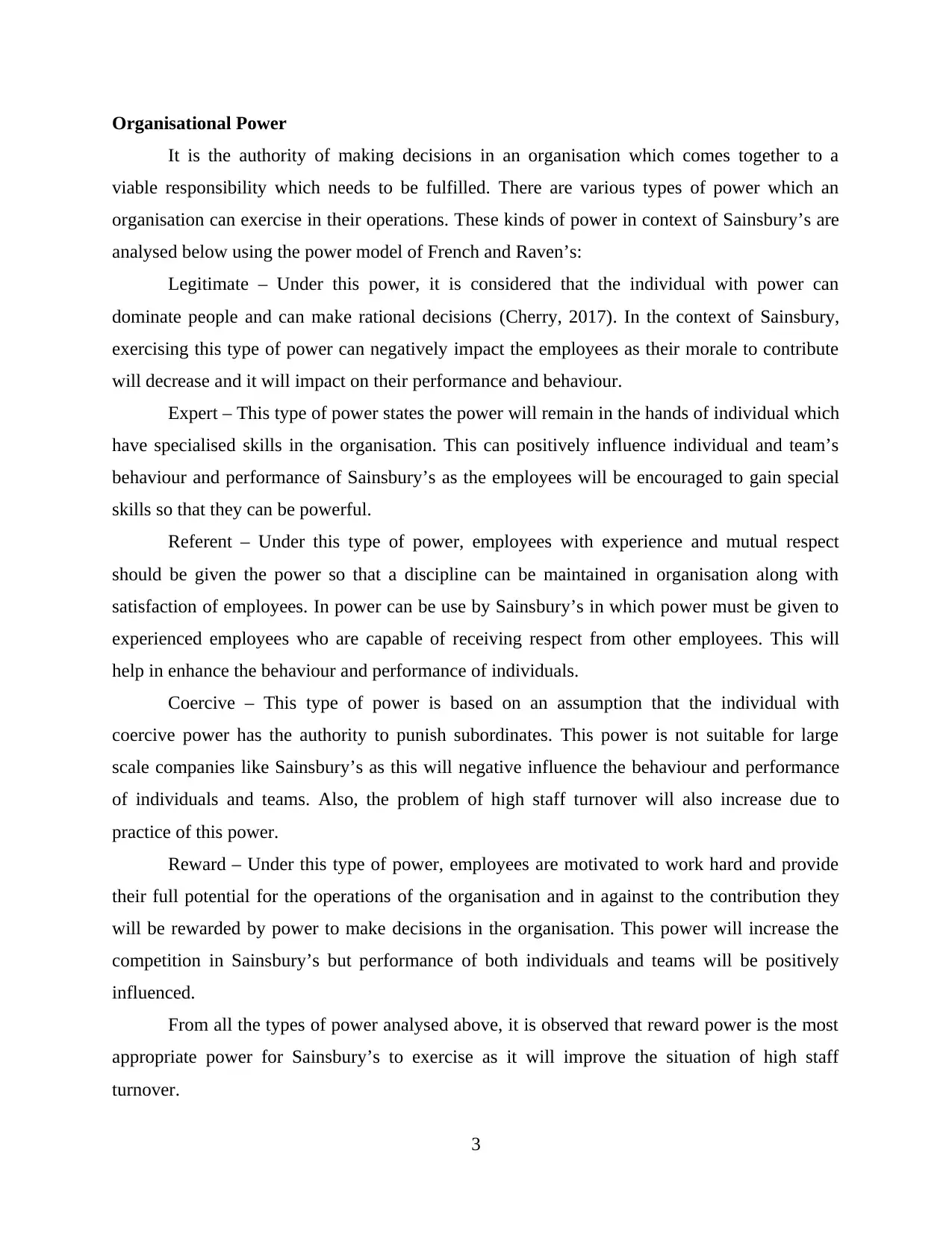
Organisational Power
It is the authority of making decisions in an organisation which comes together to a
viable responsibility which needs to be fulfilled. There are various types of power which an
organisation can exercise in their operations. These kinds of power in context of Sainsbury’s are
analysed below using the power model of French and Raven’s:
Legitimate – Under this power, it is considered that the individual with power can
dominate people and can make rational decisions (Cherry, 2017). In the context of Sainsbury,
exercising this type of power can negatively impact the employees as their morale to contribute
will decrease and it will impact on their performance and behaviour.
Expert – This type of power states the power will remain in the hands of individual which
have specialised skills in the organisation. This can positively influence individual and team’s
behaviour and performance of Sainsbury’s as the employees will be encouraged to gain special
skills so that they can be powerful.
Referent – Under this type of power, employees with experience and mutual respect
should be given the power so that a discipline can be maintained in organisation along with
satisfaction of employees. In power can be use by Sainsbury’s in which power must be given to
experienced employees who are capable of receiving respect from other employees. This will
help in enhance the behaviour and performance of individuals.
Coercive – This type of power is based on an assumption that the individual with
coercive power has the authority to punish subordinates. This power is not suitable for large
scale companies like Sainsbury’s as this will negative influence the behaviour and performance
of individuals and teams. Also, the problem of high staff turnover will also increase due to
practice of this power.
Reward – Under this type of power, employees are motivated to work hard and provide
their full potential for the operations of the organisation and in against to the contribution they
will be rewarded by power to make decisions in the organisation. This power will increase the
competition in Sainsbury’s but performance of both individuals and teams will be positively
influenced.
From all the types of power analysed above, it is observed that reward power is the most
appropriate power for Sainsbury’s to exercise as it will improve the situation of high staff
turnover.
3
It is the authority of making decisions in an organisation which comes together to a
viable responsibility which needs to be fulfilled. There are various types of power which an
organisation can exercise in their operations. These kinds of power in context of Sainsbury’s are
analysed below using the power model of French and Raven’s:
Legitimate – Under this power, it is considered that the individual with power can
dominate people and can make rational decisions (Cherry, 2017). In the context of Sainsbury,
exercising this type of power can negatively impact the employees as their morale to contribute
will decrease and it will impact on their performance and behaviour.
Expert – This type of power states the power will remain in the hands of individual which
have specialised skills in the organisation. This can positively influence individual and team’s
behaviour and performance of Sainsbury’s as the employees will be encouraged to gain special
skills so that they can be powerful.
Referent – Under this type of power, employees with experience and mutual respect
should be given the power so that a discipline can be maintained in organisation along with
satisfaction of employees. In power can be use by Sainsbury’s in which power must be given to
experienced employees who are capable of receiving respect from other employees. This will
help in enhance the behaviour and performance of individuals.
Coercive – This type of power is based on an assumption that the individual with
coercive power has the authority to punish subordinates. This power is not suitable for large
scale companies like Sainsbury’s as this will negative influence the behaviour and performance
of individuals and teams. Also, the problem of high staff turnover will also increase due to
practice of this power.
Reward – Under this type of power, employees are motivated to work hard and provide
their full potential for the operations of the organisation and in against to the contribution they
will be rewarded by power to make decisions in the organisation. This power will increase the
competition in Sainsbury’s but performance of both individuals and teams will be positively
influenced.
From all the types of power analysed above, it is observed that reward power is the most
appropriate power for Sainsbury’s to exercise as it will improve the situation of high staff
turnover.
3
⊘ This is a preview!⊘
Do you want full access?
Subscribe today to unlock all pages.

Trusted by 1+ million students worldwide
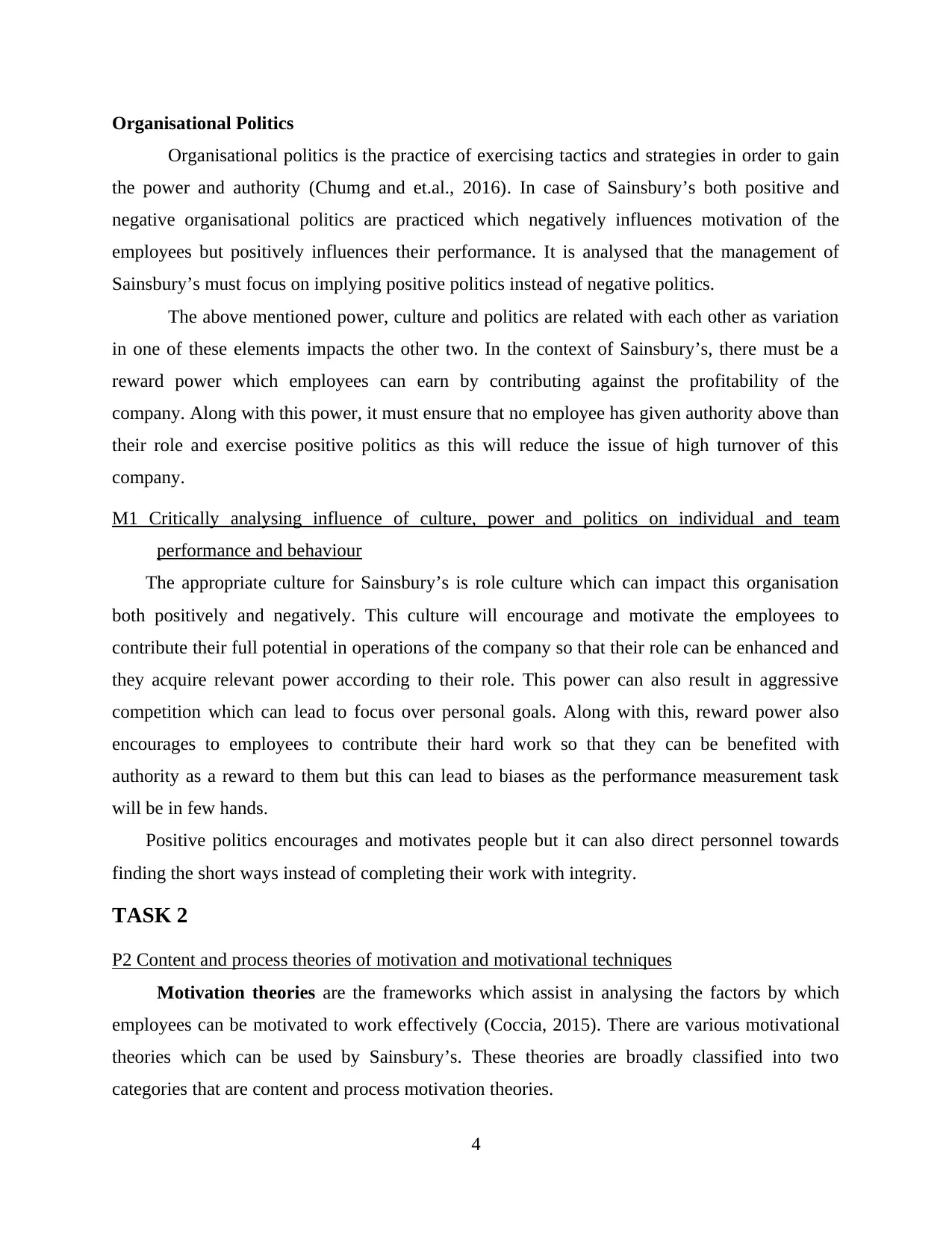
Organisational Politics
Organisational politics is the practice of exercising tactics and strategies in order to gain
the power and authority (Chumg and et.al., 2016). In case of Sainsbury’s both positive and
negative organisational politics are practiced which negatively influences motivation of the
employees but positively influences their performance. It is analysed that the management of
Sainsbury’s must focus on implying positive politics instead of negative politics.
The above mentioned power, culture and politics are related with each other as variation
in one of these elements impacts the other two. In the context of Sainsbury’s, there must be a
reward power which employees can earn by contributing against the profitability of the
company. Along with this power, it must ensure that no employee has given authority above than
their role and exercise positive politics as this will reduce the issue of high turnover of this
company.
M1 Critically analysing influence of culture, power and politics on individual and team
performance and behaviour
The appropriate culture for Sainsbury’s is role culture which can impact this organisation
both positively and negatively. This culture will encourage and motivate the employees to
contribute their full potential in operations of the company so that their role can be enhanced and
they acquire relevant power according to their role. This power can also result in aggressive
competition which can lead to focus over personal goals. Along with this, reward power also
encourages to employees to contribute their hard work so that they can be benefited with
authority as a reward to them but this can lead to biases as the performance measurement task
will be in few hands.
Positive politics encourages and motivates people but it can also direct personnel towards
finding the short ways instead of completing their work with integrity.
TASK 2
P2 Content and process theories of motivation and motivational techniques
Motivation theories are the frameworks which assist in analysing the factors by which
employees can be motivated to work effectively (Coccia, 2015). There are various motivational
theories which can be used by Sainsbury’s. These theories are broadly classified into two
categories that are content and process motivation theories.
4
Organisational politics is the practice of exercising tactics and strategies in order to gain
the power and authority (Chumg and et.al., 2016). In case of Sainsbury’s both positive and
negative organisational politics are practiced which negatively influences motivation of the
employees but positively influences their performance. It is analysed that the management of
Sainsbury’s must focus on implying positive politics instead of negative politics.
The above mentioned power, culture and politics are related with each other as variation
in one of these elements impacts the other two. In the context of Sainsbury’s, there must be a
reward power which employees can earn by contributing against the profitability of the
company. Along with this power, it must ensure that no employee has given authority above than
their role and exercise positive politics as this will reduce the issue of high turnover of this
company.
M1 Critically analysing influence of culture, power and politics on individual and team
performance and behaviour
The appropriate culture for Sainsbury’s is role culture which can impact this organisation
both positively and negatively. This culture will encourage and motivate the employees to
contribute their full potential in operations of the company so that their role can be enhanced and
they acquire relevant power according to their role. This power can also result in aggressive
competition which can lead to focus over personal goals. Along with this, reward power also
encourages to employees to contribute their hard work so that they can be benefited with
authority as a reward to them but this can lead to biases as the performance measurement task
will be in few hands.
Positive politics encourages and motivates people but it can also direct personnel towards
finding the short ways instead of completing their work with integrity.
TASK 2
P2 Content and process theories of motivation and motivational techniques
Motivation theories are the frameworks which assist in analysing the factors by which
employees can be motivated to work effectively (Coccia, 2015). There are various motivational
theories which can be used by Sainsbury’s. These theories are broadly classified into two
categories that are content and process motivation theories.
4
Paraphrase This Document
Need a fresh take? Get an instant paraphrase of this document with our AI Paraphraser
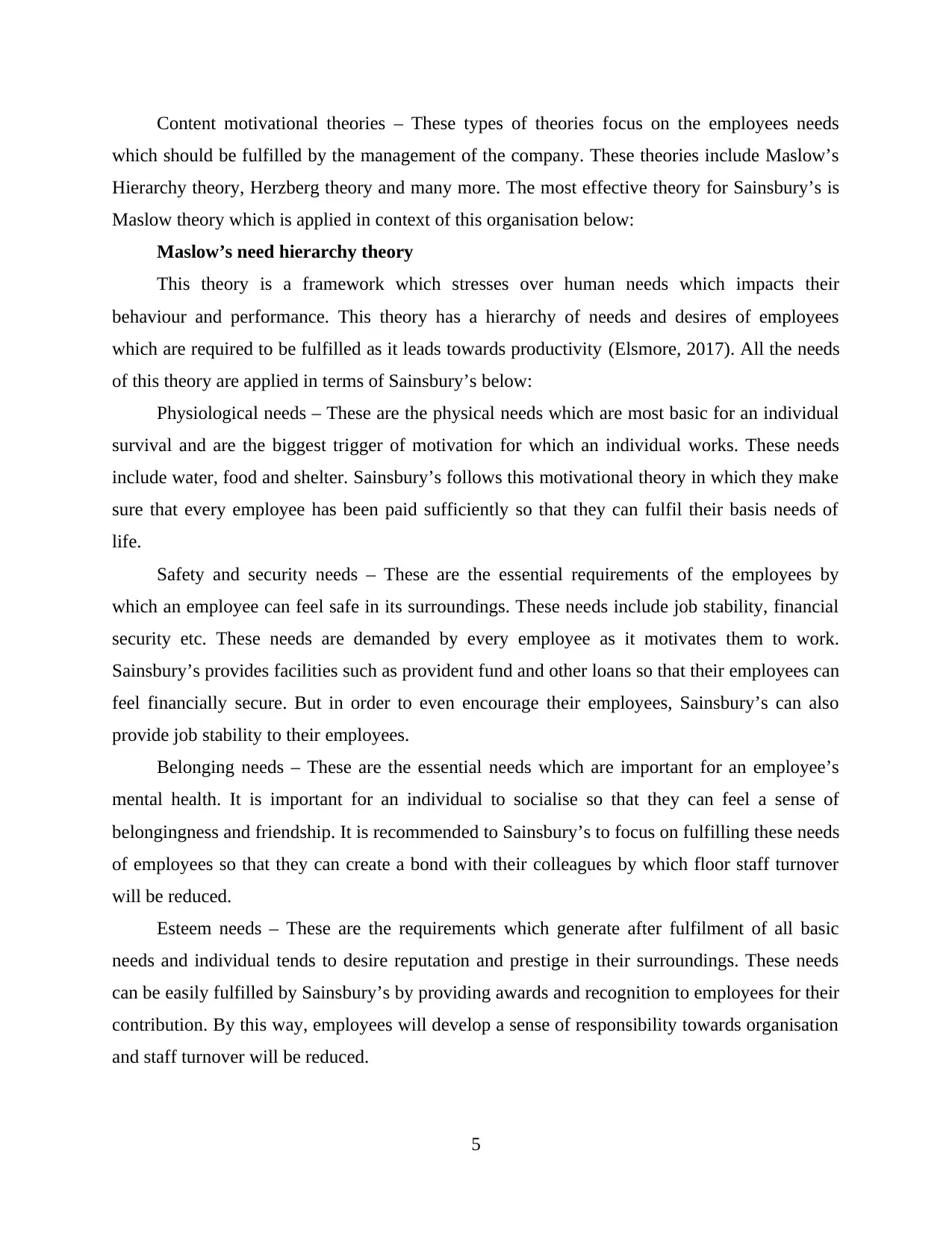
Content motivational theories – These types of theories focus on the employees needs
which should be fulfilled by the management of the company. These theories include Maslow’s
Hierarchy theory, Herzberg theory and many more. The most effective theory for Sainsbury’s is
Maslow theory which is applied in context of this organisation below:
Maslow’s need hierarchy theory
This theory is a framework which stresses over human needs which impacts their
behaviour and performance. This theory has a hierarchy of needs and desires of employees
which are required to be fulfilled as it leads towards productivity (Elsmore, 2017). All the needs
of this theory are applied in terms of Sainsbury’s below:
Physiological needs – These are the physical needs which are most basic for an individual
survival and are the biggest trigger of motivation for which an individual works. These needs
include water, food and shelter. Sainsbury’s follows this motivational theory in which they make
sure that every employee has been paid sufficiently so that they can fulfil their basis needs of
life.
Safety and security needs – These are the essential requirements of the employees by
which an employee can feel safe in its surroundings. These needs include job stability, financial
security etc. These needs are demanded by every employee as it motivates them to work.
Sainsbury’s provides facilities such as provident fund and other loans so that their employees can
feel financially secure. But in order to even encourage their employees, Sainsbury’s can also
provide job stability to their employees.
Belonging needs – These are the essential needs which are important for an employee’s
mental health. It is important for an individual to socialise so that they can feel a sense of
belongingness and friendship. It is recommended to Sainsbury’s to focus on fulfilling these needs
of employees so that they can create a bond with their colleagues by which floor staff turnover
will be reduced.
Esteem needs – These are the requirements which generate after fulfilment of all basic
needs and individual tends to desire reputation and prestige in their surroundings. These needs
can be easily fulfilled by Sainsbury’s by providing awards and recognition to employees for their
contribution. By this way, employees will develop a sense of responsibility towards organisation
and staff turnover will be reduced.
5
which should be fulfilled by the management of the company. These theories include Maslow’s
Hierarchy theory, Herzberg theory and many more. The most effective theory for Sainsbury’s is
Maslow theory which is applied in context of this organisation below:
Maslow’s need hierarchy theory
This theory is a framework which stresses over human needs which impacts their
behaviour and performance. This theory has a hierarchy of needs and desires of employees
which are required to be fulfilled as it leads towards productivity (Elsmore, 2017). All the needs
of this theory are applied in terms of Sainsbury’s below:
Physiological needs – These are the physical needs which are most basic for an individual
survival and are the biggest trigger of motivation for which an individual works. These needs
include water, food and shelter. Sainsbury’s follows this motivational theory in which they make
sure that every employee has been paid sufficiently so that they can fulfil their basis needs of
life.
Safety and security needs – These are the essential requirements of the employees by
which an employee can feel safe in its surroundings. These needs include job stability, financial
security etc. These needs are demanded by every employee as it motivates them to work.
Sainsbury’s provides facilities such as provident fund and other loans so that their employees can
feel financially secure. But in order to even encourage their employees, Sainsbury’s can also
provide job stability to their employees.
Belonging needs – These are the essential needs which are important for an employee’s
mental health. It is important for an individual to socialise so that they can feel a sense of
belongingness and friendship. It is recommended to Sainsbury’s to focus on fulfilling these needs
of employees so that they can create a bond with their colleagues by which floor staff turnover
will be reduced.
Esteem needs – These are the requirements which generate after fulfilment of all basic
needs and individual tends to desire reputation and prestige in their surroundings. These needs
can be easily fulfilled by Sainsbury’s by providing awards and recognition to employees for their
contribution. By this way, employees will develop a sense of responsibility towards organisation
and staff turnover will be reduced.
5
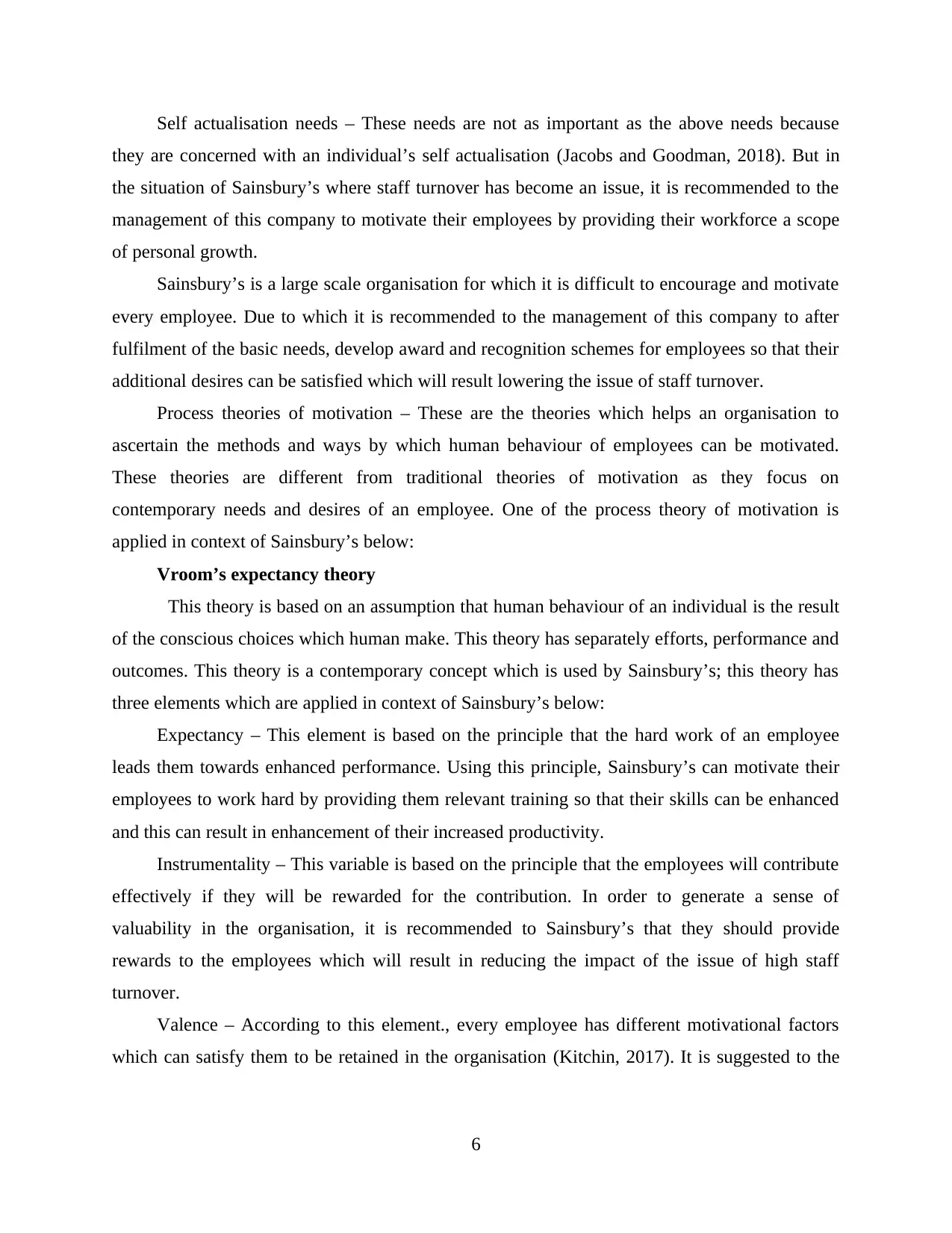
Self actualisation needs – These needs are not as important as the above needs because
they are concerned with an individual’s self actualisation (Jacobs and Goodman, 2018). But in
the situation of Sainsbury’s where staff turnover has become an issue, it is recommended to the
management of this company to motivate their employees by providing their workforce a scope
of personal growth.
Sainsbury’s is a large scale organisation for which it is difficult to encourage and motivate
every employee. Due to which it is recommended to the management of this company to after
fulfilment of the basic needs, develop award and recognition schemes for employees so that their
additional desires can be satisfied which will result lowering the issue of staff turnover.
Process theories of motivation – These are the theories which helps an organisation to
ascertain the methods and ways by which human behaviour of employees can be motivated.
These theories are different from traditional theories of motivation as they focus on
contemporary needs and desires of an employee. One of the process theory of motivation is
applied in context of Sainsbury’s below:
Vroom’s expectancy theory
This theory is based on an assumption that human behaviour of an individual is the result
of the conscious choices which human make. This theory has separately efforts, performance and
outcomes. This theory is a contemporary concept which is used by Sainsbury’s; this theory has
three elements which are applied in context of Sainsbury’s below:
Expectancy – This element is based on the principle that the hard work of an employee
leads them towards enhanced performance. Using this principle, Sainsbury’s can motivate their
employees to work hard by providing them relevant training so that their skills can be enhanced
and this can result in enhancement of their increased productivity.
Instrumentality – This variable is based on the principle that the employees will contribute
effectively if they will be rewarded for the contribution. In order to generate a sense of
valuability in the organisation, it is recommended to Sainsbury’s that they should provide
rewards to the employees which will result in reducing the impact of the issue of high staff
turnover.
Valence – According to this element., every employee has different motivational factors
which can satisfy them to be retained in the organisation (Kitchin, 2017). It is suggested to the
6
they are concerned with an individual’s self actualisation (Jacobs and Goodman, 2018). But in
the situation of Sainsbury’s where staff turnover has become an issue, it is recommended to the
management of this company to motivate their employees by providing their workforce a scope
of personal growth.
Sainsbury’s is a large scale organisation for which it is difficult to encourage and motivate
every employee. Due to which it is recommended to the management of this company to after
fulfilment of the basic needs, develop award and recognition schemes for employees so that their
additional desires can be satisfied which will result lowering the issue of staff turnover.
Process theories of motivation – These are the theories which helps an organisation to
ascertain the methods and ways by which human behaviour of employees can be motivated.
These theories are different from traditional theories of motivation as they focus on
contemporary needs and desires of an employee. One of the process theory of motivation is
applied in context of Sainsbury’s below:
Vroom’s expectancy theory
This theory is based on an assumption that human behaviour of an individual is the result
of the conscious choices which human make. This theory has separately efforts, performance and
outcomes. This theory is a contemporary concept which is used by Sainsbury’s; this theory has
three elements which are applied in context of Sainsbury’s below:
Expectancy – This element is based on the principle that the hard work of an employee
leads them towards enhanced performance. Using this principle, Sainsbury’s can motivate their
employees to work hard by providing them relevant training so that their skills can be enhanced
and this can result in enhancement of their increased productivity.
Instrumentality – This variable is based on the principle that the employees will contribute
effectively if they will be rewarded for the contribution. In order to generate a sense of
valuability in the organisation, it is recommended to Sainsbury’s that they should provide
rewards to the employees which will result in reducing the impact of the issue of high staff
turnover.
Valence – According to this element., every employee has different motivational factors
which can satisfy them to be retained in the organisation (Kitchin, 2017). It is suggested to the
6
⊘ This is a preview!⊘
Do you want full access?
Subscribe today to unlock all pages.

Trusted by 1+ million students worldwide
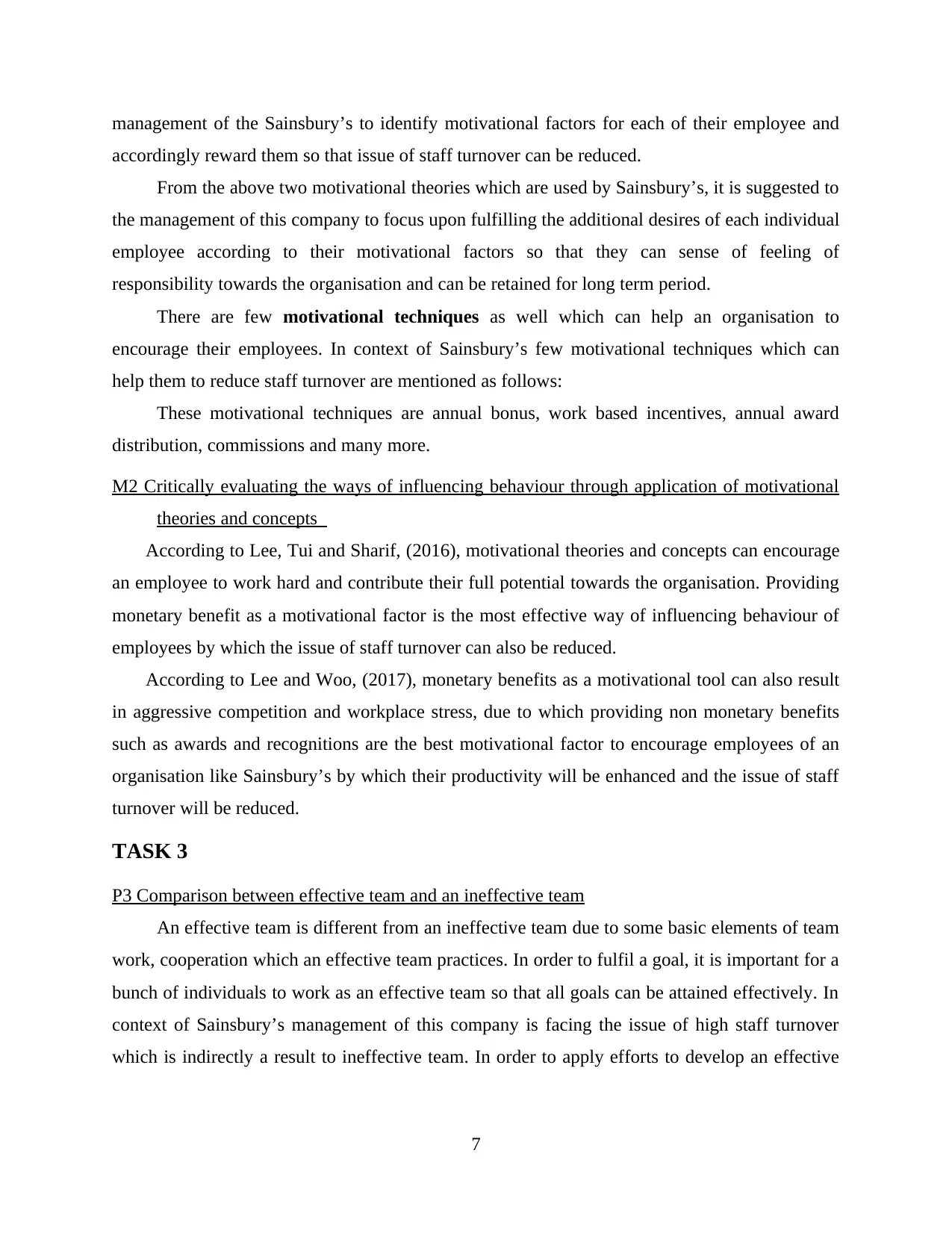
management of the Sainsbury’s to identify motivational factors for each of their employee and
accordingly reward them so that issue of staff turnover can be reduced.
From the above two motivational theories which are used by Sainsbury’s, it is suggested to
the management of this company to focus upon fulfilling the additional desires of each individual
employee according to their motivational factors so that they can sense of feeling of
responsibility towards the organisation and can be retained for long term period.
There are few motivational techniques as well which can help an organisation to
encourage their employees. In context of Sainsbury’s few motivational techniques which can
help them to reduce staff turnover are mentioned as follows:
These motivational techniques are annual bonus, work based incentives, annual award
distribution, commissions and many more.
M2 Critically evaluating the ways of influencing behaviour through application of motivational
theories and concepts
According to Lee, Tui and Sharif, (2016), motivational theories and concepts can encourage
an employee to work hard and contribute their full potential towards the organisation. Providing
monetary benefit as a motivational factor is the most effective way of influencing behaviour of
employees by which the issue of staff turnover can also be reduced.
According to Lee and Woo, (2017), monetary benefits as a motivational tool can also result
in aggressive competition and workplace stress, due to which providing non monetary benefits
such as awards and recognitions are the best motivational factor to encourage employees of an
organisation like Sainsbury’s by which their productivity will be enhanced and the issue of staff
turnover will be reduced.
TASK 3
P3 Comparison between effective team and an ineffective team
An effective team is different from an ineffective team due to some basic elements of team
work, cooperation which an effective team practices. In order to fulfil a goal, it is important for a
bunch of individuals to work as an effective team so that all goals can be attained effectively. In
context of Sainsbury’s management of this company is facing the issue of high staff turnover
which is indirectly a result to ineffective team. In order to apply efforts to develop an effective
7
accordingly reward them so that issue of staff turnover can be reduced.
From the above two motivational theories which are used by Sainsbury’s, it is suggested to
the management of this company to focus upon fulfilling the additional desires of each individual
employee according to their motivational factors so that they can sense of feeling of
responsibility towards the organisation and can be retained for long term period.
There are few motivational techniques as well which can help an organisation to
encourage their employees. In context of Sainsbury’s few motivational techniques which can
help them to reduce staff turnover are mentioned as follows:
These motivational techniques are annual bonus, work based incentives, annual award
distribution, commissions and many more.
M2 Critically evaluating the ways of influencing behaviour through application of motivational
theories and concepts
According to Lee, Tui and Sharif, (2016), motivational theories and concepts can encourage
an employee to work hard and contribute their full potential towards the organisation. Providing
monetary benefit as a motivational factor is the most effective way of influencing behaviour of
employees by which the issue of staff turnover can also be reduced.
According to Lee and Woo, (2017), monetary benefits as a motivational tool can also result
in aggressive competition and workplace stress, due to which providing non monetary benefits
such as awards and recognitions are the best motivational factor to encourage employees of an
organisation like Sainsbury’s by which their productivity will be enhanced and the issue of staff
turnover will be reduced.
TASK 3
P3 Comparison between effective team and an ineffective team
An effective team is different from an ineffective team due to some basic elements of team
work, cooperation which an effective team practices. In order to fulfil a goal, it is important for a
bunch of individuals to work as an effective team so that all goals can be attained effectively. In
context of Sainsbury’s management of this company is facing the issue of high staff turnover
which is indirectly a result to ineffective team. In order to apply efforts to develop an effective
7
Paraphrase This Document
Need a fresh take? Get an instant paraphrase of this document with our AI Paraphraser
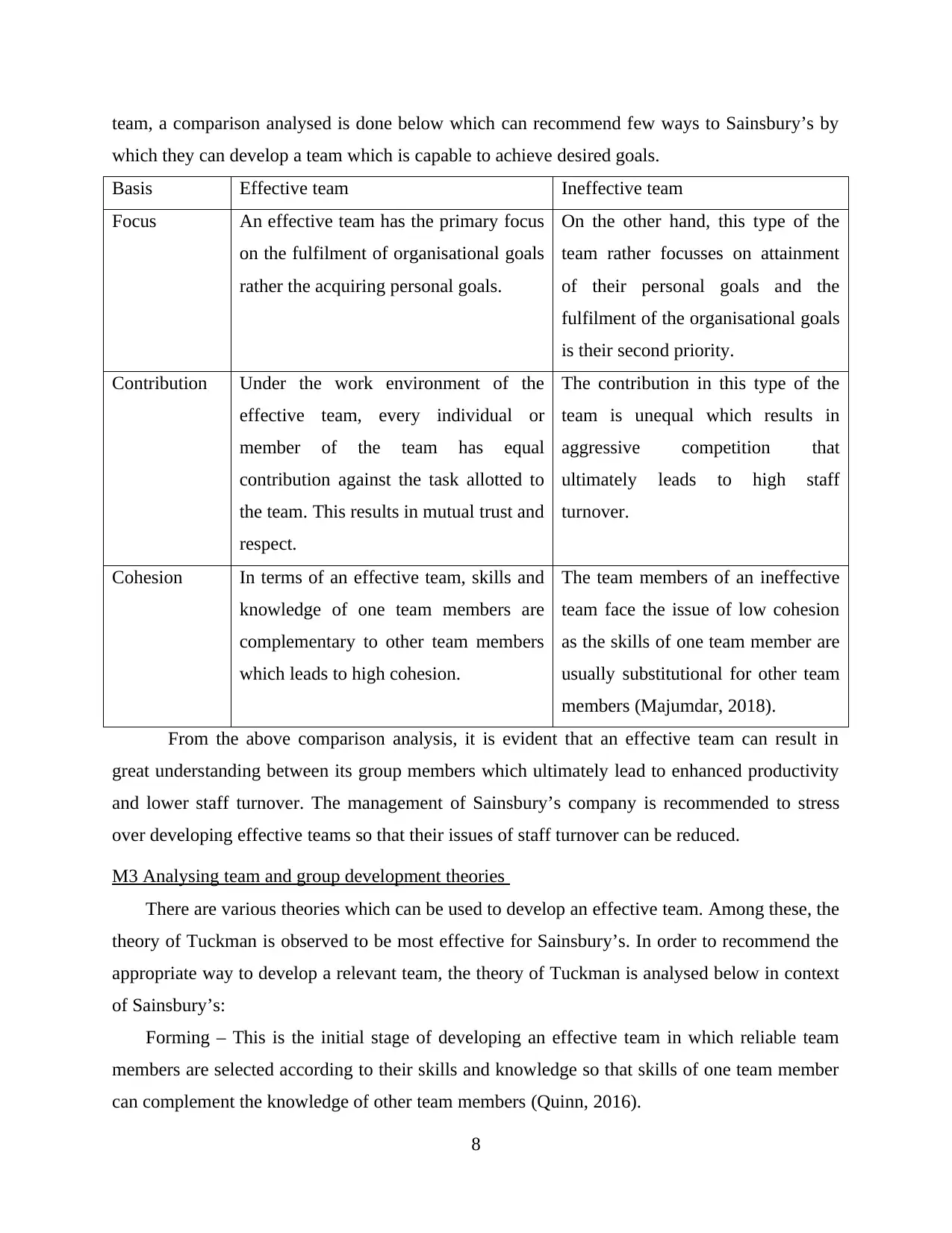
team, a comparison analysed is done below which can recommend few ways to Sainsbury’s by
which they can develop a team which is capable to achieve desired goals.
Basis Effective team Ineffective team
Focus An effective team has the primary focus
on the fulfilment of organisational goals
rather the acquiring personal goals.
On the other hand, this type of the
team rather focusses on attainment
of their personal goals and the
fulfilment of the organisational goals
is their second priority.
Contribution Under the work environment of the
effective team, every individual or
member of the team has equal
contribution against the task allotted to
the team. This results in mutual trust and
respect.
The contribution in this type of the
team is unequal which results in
aggressive competition that
ultimately leads to high staff
turnover.
Cohesion In terms of an effective team, skills and
knowledge of one team members are
complementary to other team members
which leads to high cohesion.
The team members of an ineffective
team face the issue of low cohesion
as the skills of one team member are
usually substitutional for other team
members (Majumdar, 2018).
From the above comparison analysis, it is evident that an effective team can result in
great understanding between its group members which ultimately lead to enhanced productivity
and lower staff turnover. The management of Sainsbury’s company is recommended to stress
over developing effective teams so that their issues of staff turnover can be reduced.
M3 Analysing team and group development theories
There are various theories which can be used to develop an effective team. Among these, the
theory of Tuckman is observed to be most effective for Sainsbury’s. In order to recommend the
appropriate way to develop a relevant team, the theory of Tuckman is analysed below in context
of Sainsbury’s:
Forming – This is the initial stage of developing an effective team in which reliable team
members are selected according to their skills and knowledge so that skills of one team member
can complement the knowledge of other team members (Quinn, 2016).
8
which they can develop a team which is capable to achieve desired goals.
Basis Effective team Ineffective team
Focus An effective team has the primary focus
on the fulfilment of organisational goals
rather the acquiring personal goals.
On the other hand, this type of the
team rather focusses on attainment
of their personal goals and the
fulfilment of the organisational goals
is their second priority.
Contribution Under the work environment of the
effective team, every individual or
member of the team has equal
contribution against the task allotted to
the team. This results in mutual trust and
respect.
The contribution in this type of the
team is unequal which results in
aggressive competition that
ultimately leads to high staff
turnover.
Cohesion In terms of an effective team, skills and
knowledge of one team members are
complementary to other team members
which leads to high cohesion.
The team members of an ineffective
team face the issue of low cohesion
as the skills of one team member are
usually substitutional for other team
members (Majumdar, 2018).
From the above comparison analysis, it is evident that an effective team can result in
great understanding between its group members which ultimately lead to enhanced productivity
and lower staff turnover. The management of Sainsbury’s company is recommended to stress
over developing effective teams so that their issues of staff turnover can be reduced.
M3 Analysing team and group development theories
There are various theories which can be used to develop an effective team. Among these, the
theory of Tuckman is observed to be most effective for Sainsbury’s. In order to recommend the
appropriate way to develop a relevant team, the theory of Tuckman is analysed below in context
of Sainsbury’s:
Forming – This is the initial stage of developing an effective team in which reliable team
members are selected according to their skills and knowledge so that skills of one team member
can complement the knowledge of other team members (Quinn, 2016).
8
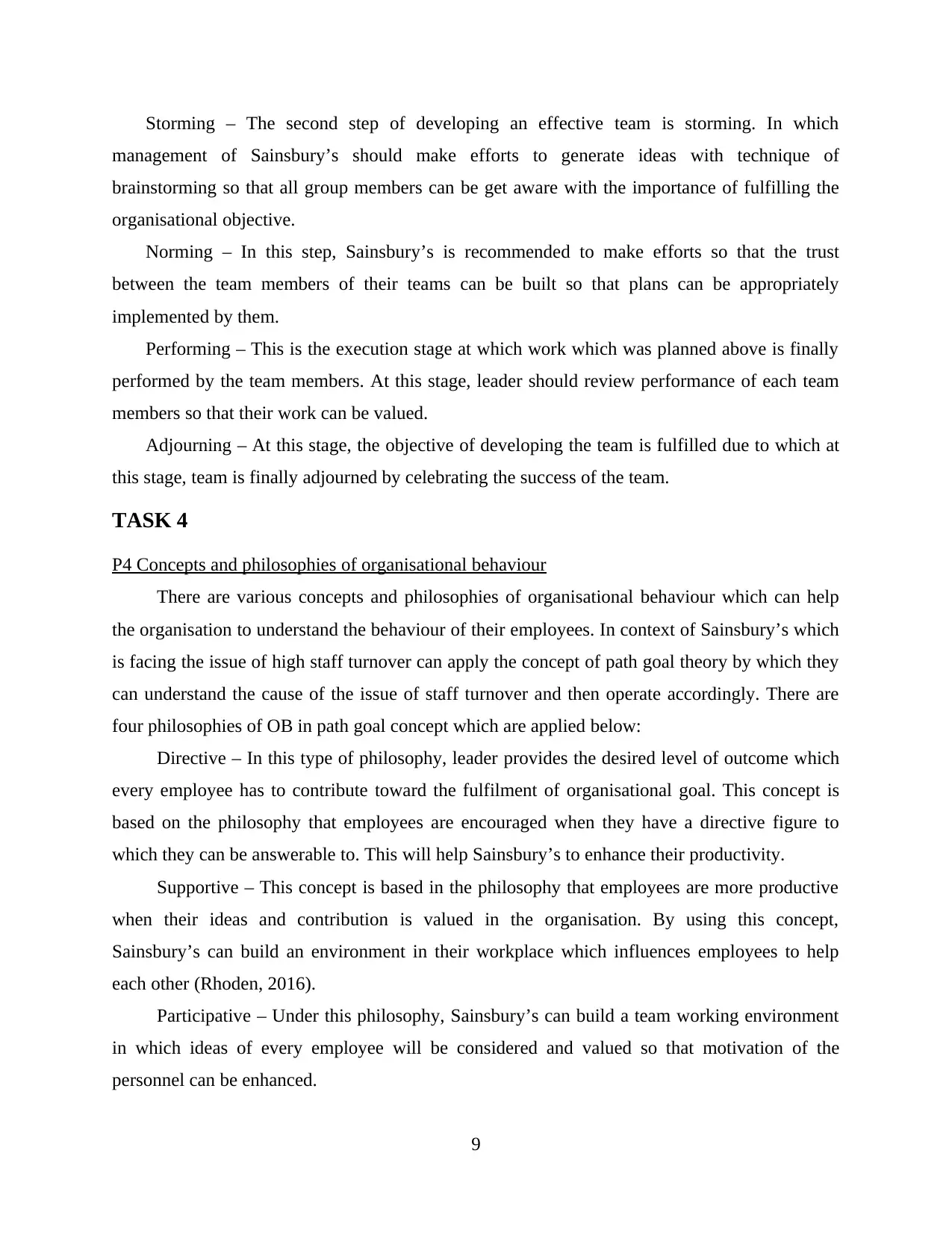
Storming – The second step of developing an effective team is storming. In which
management of Sainsbury’s should make efforts to generate ideas with technique of
brainstorming so that all group members can be get aware with the importance of fulfilling the
organisational objective.
Norming – In this step, Sainsbury’s is recommended to make efforts so that the trust
between the team members of their teams can be built so that plans can be appropriately
implemented by them.
Performing – This is the execution stage at which work which was planned above is finally
performed by the team members. At this stage, leader should review performance of each team
members so that their work can be valued.
Adjourning – At this stage, the objective of developing the team is fulfilled due to which at
this stage, team is finally adjourned by celebrating the success of the team.
TASK 4
P4 Concepts and philosophies of organisational behaviour
There are various concepts and philosophies of organisational behaviour which can help
the organisation to understand the behaviour of their employees. In context of Sainsbury’s which
is facing the issue of high staff turnover can apply the concept of path goal theory by which they
can understand the cause of the issue of staff turnover and then operate accordingly. There are
four philosophies of OB in path goal concept which are applied below:
Directive – In this type of philosophy, leader provides the desired level of outcome which
every employee has to contribute toward the fulfilment of organisational goal. This concept is
based on the philosophy that employees are encouraged when they have a directive figure to
which they can be answerable to. This will help Sainsbury’s to enhance their productivity.
Supportive – This concept is based in the philosophy that employees are more productive
when their ideas and contribution is valued in the organisation. By using this concept,
Sainsbury’s can build an environment in their workplace which influences employees to help
each other (Rhoden, 2016).
Participative – Under this philosophy, Sainsbury’s can build a team working environment
in which ideas of every employee will be considered and valued so that motivation of the
personnel can be enhanced.
9
management of Sainsbury’s should make efforts to generate ideas with technique of
brainstorming so that all group members can be get aware with the importance of fulfilling the
organisational objective.
Norming – In this step, Sainsbury’s is recommended to make efforts so that the trust
between the team members of their teams can be built so that plans can be appropriately
implemented by them.
Performing – This is the execution stage at which work which was planned above is finally
performed by the team members. At this stage, leader should review performance of each team
members so that their work can be valued.
Adjourning – At this stage, the objective of developing the team is fulfilled due to which at
this stage, team is finally adjourned by celebrating the success of the team.
TASK 4
P4 Concepts and philosophies of organisational behaviour
There are various concepts and philosophies of organisational behaviour which can help
the organisation to understand the behaviour of their employees. In context of Sainsbury’s which
is facing the issue of high staff turnover can apply the concept of path goal theory by which they
can understand the cause of the issue of staff turnover and then operate accordingly. There are
four philosophies of OB in path goal concept which are applied below:
Directive – In this type of philosophy, leader provides the desired level of outcome which
every employee has to contribute toward the fulfilment of organisational goal. This concept is
based on the philosophy that employees are encouraged when they have a directive figure to
which they can be answerable to. This will help Sainsbury’s to enhance their productivity.
Supportive – This concept is based in the philosophy that employees are more productive
when their ideas and contribution is valued in the organisation. By using this concept,
Sainsbury’s can build an environment in their workplace which influences employees to help
each other (Rhoden, 2016).
Participative – Under this philosophy, Sainsbury’s can build a team working environment
in which ideas of every employee will be considered and valued so that motivation of the
personnel can be enhanced.
9
⊘ This is a preview!⊘
Do you want full access?
Subscribe today to unlock all pages.

Trusted by 1+ million students worldwide
1 out of 14
Related Documents
Your All-in-One AI-Powered Toolkit for Academic Success.
+13062052269
info@desklib.com
Available 24*7 on WhatsApp / Email
![[object Object]](/_next/static/media/star-bottom.7253800d.svg)
Unlock your academic potential
Copyright © 2020–2026 A2Z Services. All Rights Reserved. Developed and managed by ZUCOL.




